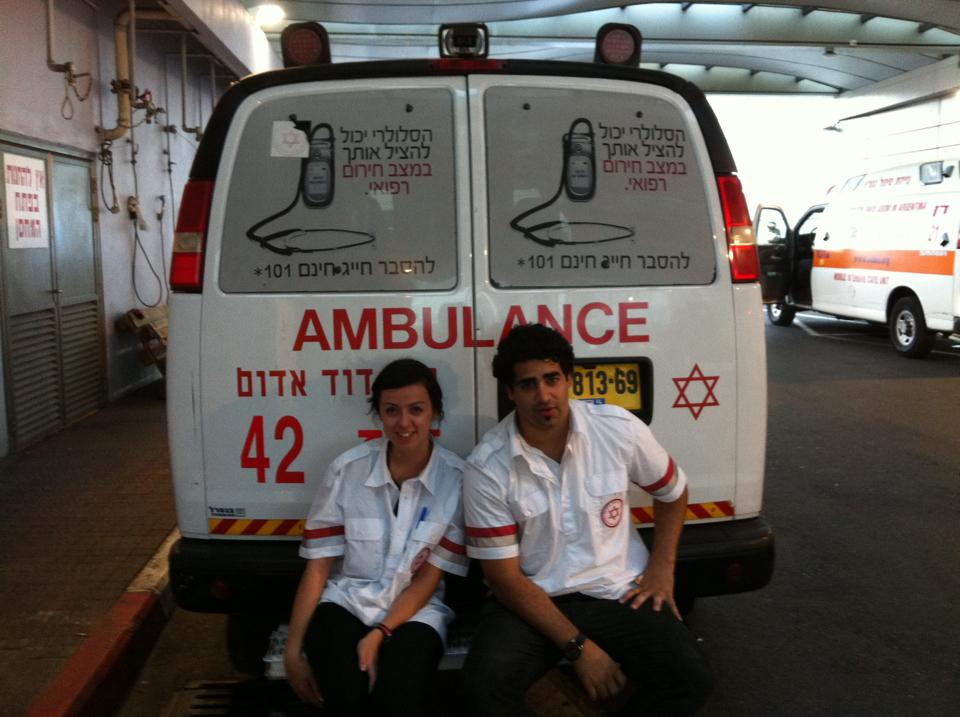CHS alum serves with volunteer ambulance crew during bombings in Tel Aviv

Two months of volunteer ambulance service in Israel seemed like a great way for CHS alumnus Danica Reid to help people in a practical way.
The Estevan paramedic had no idea her assignment in Tel Aviv would include running from enemy rockets and helping in the aftermath of a bus bombing.
“I was in Tel Aviv with seven other volunteers,” she said. “They said, ‘Oh, you don’t have to worry. Nothing ever happens in Tel Aviv. It’s the safest place in the country.’ With the latest tension that happened, Hamas was firing rockets. That’s not so uncommon especially down south toward the Gaza Strip, but they had gotten their hands on some rockets that were big enough to reach Tel Aviv. So for five or six days we had warning sirens going off about once a day.”
The warning sirens called for immediate response.
“The warning siren went off signaling a rocket was headed to Tel Aviv,” Reid said. “You had 15 seconds to get to a bomb shelter, a safe room or a staircase. If you were outside, you’d run inside a building.”
With the short response time, Reid found herself waiting out the bomb threats in some unlikely places.
“For one I was in the back of a fabric shop,” she recounted. “Another one I was in the back of a bakery. All the store owners help you out. I never made it to a bomb shelter.”
Reid describes the experience of waiting through the bomb threat.
“You can hear a few big booms in the sky as the Iron Dome, Israel’s air defence system, downs the rocket . . . and then wait for a little bit to make sure there weren’t any more and then back outside and go on with daily life.”
The quick switch back to regular routine seemed a bit surreal to Reid.
“The first maybe five minutes after a rocket went off everybody would be on their cell phone calling friends and family making sure they were okay,” she explained. “Then after that you can’t even tell anything went off. Everybody just goes back to normal life. It’s a part of normal life. It happens so often there.”
Toward the end of the conflict, when Reid’s ambulance had just dropped a patient off at the main hospital in Tel Aviv, a man came running up to them frantically speaking in Hebrew.
“The driver of the ambulance said, ‘There’s been an explosion on a bus,’” Reid exclaimed. “We took off. We were just a couple of blocks away. By the time we got there we were probably the sixth ambulance on the scene. They’re definitely prepared for this sort of thing which is a sad reality of life there.”
Reid and her team learned that the incident was not caused by a suicide bomber, but instead someone had walked up to the bus entrance and tossed a bag on board when the door opened. There were no fatalities. The emergency workers searched the scene for those who had been injured.
“When we got out of the ambulance, the scene was just chaos,” Reid exclaimed. “People were yelling and pointing. They said ‘If you go into the scene, just make sure you stay close to your driver.’ I remember walking right past the bus. There was glass everywhere. We were crunching on glass. The bus was just a shell basically. The seats were still there – lots of them were scorched where the bomb had gone off. There were military police there working to make sure there weren’t any more bombs.”
Reid and her team were waved into a building where someone needed help.
“It turns out we transported the driver of the bus,” Reid explained. “Physically he wasn’t too injured. He had a large cut across one of his hands and he had a bunch of blood on his shirt. We checked him over and he didn’t have any injuries on his chest so it was most likely from waving his hand around or it was somebody else’s blood that had gotten onto him. He had glass in his hair and he was really worked up.”
The volunteer ambulance worker found amazing organization at the hospital during the emergency.
“They have a protocol in place where they have doctors and nurses meeting the ambulances outside the hospital,” she said. “We unloaded (our passenger) onto a hospital bed and we were available to go right back to the scene if they needed us. They had enough help that we didn’t need to go back.”
The Estevan resident insists that during the bus bomb ordeal, she was never afraid.
“It never really crossed my mind to be scared,” she said. “At that point I was focused on why I was there – looking for anybody that needed help.”
Reid, who is now back to work in Estevan, hopes to eventually be on a list of emergency workers who are called upon to help in natural disasters around the world.
“When there’s a natural disaster somewhere in the world, they have people on a list they call up and they can be on a plane to the country where a natural disaster happened within 24 hours,” she explained. “I’d love to do something like that.”
